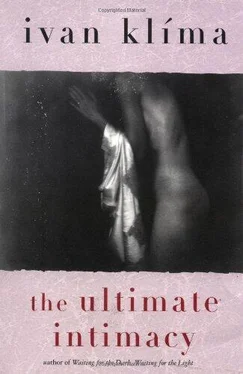Ivan Klima - The Ultimate Intimacy
Здесь есть возможность читать онлайн «Ivan Klima - The Ultimate Intimacy» весь текст электронной книги совершенно бесплатно (целиком полную версию без сокращений). В некоторых случаях можно слушать аудио, скачать через торрент в формате fb2 и присутствует краткое содержание. Год выпуска: 1998, Издательство: Grove Press, Жанр: Современная проза, на английском языке. Описание произведения, (предисловие) а так же отзывы посетителей доступны на портале библиотеки ЛибКат.
- Название:The Ultimate Intimacy
- Автор:
- Издательство:Grove Press
- Жанр:
- Год:1998
- ISBN:нет данных
- Рейтинг книги:3 / 5. Голосов: 1
-
Избранное:Добавить в избранное
- Отзывы:
-
Ваша оценка:
- 60
- 1
- 2
- 3
- 4
- 5
The Ultimate Intimacy: краткое содержание, описание и аннотация
Предлагаем к чтению аннотацию, описание, краткое содержание или предисловие (зависит от того, что написал сам автор книги «The Ultimate Intimacy»). Если вы не нашли необходимую информацию о книге — напишите в комментариях, мы постараемся отыскать её.
The Ultimate Intimacy — читать онлайн бесплатно полную книгу (весь текст) целиком
Ниже представлен текст книги, разбитый по страницам. Система сохранения места последней прочитанной страницы, позволяет с удобством читать онлайн бесплатно книгу «The Ultimate Intimacy», без необходимости каждый раз заново искать на чём Вы остановились. Поставьте закладку, и сможете в любой момент перейти на страницу, на которой закончили чтение.
Интервал:
Закладка:
she persuading him to come home straight away? Why isn't she telling him that if he came home she would stay by him and take care of him and never wander off again? Why, instead of that, is she traipsing into the hospital with flowers and a candlestick as if the place wasn't cluttered enough as it is? He scolds her for needlessly throwing money away on flowers.
'I thought you'd be pleased,' Bára says, stroking his forehead and telling him he looks really well today.
Samuel can walk, of course, but now he deliberately lies on the bed and does not look in her direction. So Bára takes the vase and goes into the ugly bathroom to fetch some water in a battered bowl. As the water runs from the tap, Bára weeps. Then she puts the flowers in the vase, wipes her eyes and actually manages to force her mouth into something resembling a smile — since she is here to comfort, not to grieve. She returns to her husband and asks him if she should light the candle.
Samuel says nothing. His silence does not mean mere silence or anxiety, instead it is the attempt of a powerless person to prove his superiority and his power. That power is now expressed solely in the ability to hurt — himself and her. So Bára lights the candle and gives him the news from the office. She also tells him she has bought Aleš some new shoes and helped him with his history homework and civic education. These future citizens are told about the unity of body and soul. Aleš had asked her what the soul was.
Samuel stares at the ceiling. Maybe he isn't listening, although it is quite likely he is but wants to demonstrate his lack of interest.
'What is the soul?' Bára asks him.
And without looking in her direction, he says, 'It's what you lack.' Eventually he looks towards her in order to see her reaction, so Bára says, 'Thank you for the explanation, I'll pass it on to Aleš.' And she thinks of Daniel: Daniel wouldn't have fobbed her off, he'd have tried to explain the soul, which he says is eternal. Daniel believes in something, something noble, unfathomable and mysterious, whereas her husband simply believes in his own strength and power, which is now gradually waning,
She peels Samuel an orange, separating the segments and arranging them neatly on a saucer. Samuel displays no interest in the orange, because that would entail him showing interest in her, the source of everything bad in his life, including the fact he is lying here on a
hospital bed and everyone stares at him as if he were a suicidal maniac.
'Wouldn't you like a bit of a walk?' Bára suggests.
To her astonishment, Samuel raises himself without a word and puts on his slippers. Then he walks out into the corridor at her side, shuffling his feet slightly. And Bára realizes that she is walking alongside an old man and she feels sorry for the man who is the father of her younger son, for the man she once loved more than anyone else, the man she once admired and revered, and whom, at the same time, she feared and whose love she longed most humbly to earn. She feels sorrow that Samuel never understood that love has to be gained through goodness of heart not through orders, that in spite of his horror of solitude he is driving himself into it because his harshness repels even his nearest and dearest.
The hospital corridor is not a long one; men in blue-and-white striped dressing-gowns sit here and there on benches and in the autumn gloom they seem to her like figures from a prison drama.
Samuel is now holding forth to her about himself and his prospects, and the unlikelihood of his ever returning to work. He feels he has lost not just interest in life, but also his powers of imagination; maybe the pills he swallowed have affected his mind. An architect without imagination is like a woodcarver without arms, she surely must appreciate that.
It's odd that he should say woodcarver. After all, Daniel does wood-carving. Sam might equally have said that an architect without imagination is like a pastor without faith. At that moment, she would have been worried that Samuel suspected something. But he suspects nothing, he simply has one of his depressions that can't be checked even by chemicals or psychotherapy; Samuel is too strong a personality for that: stubborn and unbending, even though his strength is already on the wane. So Bára comforts him: everything will sort itself out again and he will be home in a few days; he'll be properly rested and as soon as he gets back to the office he'll see that his head will be teeming with ideas.
'I'm too old,' Samuel says, 'I can't cope with it all any more. If you want to leave you're welcome.'
'What do you mean?'
'Just what I said. Leave for good.'
Bára is weeping again. She'd no intention of ever leaving him, had she? Not unless she died first.
When they say goodbye she kisses Samuel on the mouth and notices that his lips are dry and he himself is cold: he doesn't put his arms around her or hug her. Samuel's body may still be alive, but his soul is already dead.
Bára promises that she will come tomorrow morning and she rushes away because she must drive Aleš to her mother's. On her way out, the senior consultant stops her in the corridor and invites her into his consulting room to ask her a few questions about Samuel's past, and how often he used to have depressions. He wants to know whether any of his forebears had suffered from mental illness. Bára recalls Samuel's mother who refused to associate with her on the grounds that Bára had been invaded by some dark and destructive forces. At the time, Bára used to put those irrational theories down to her age. Samuel himself always said as little as possible about his mother, and when, shortly after their marriage, she died, he never spoke about her again. So Bára tells the psychiatrist that she knows of no mental illness in Samuel's family. None the less, the consultant is of the view that Samuel is not entirely fit and may never be again. His mind is hampered by delusions that are clearly paranoid in character. It will require extraordinary patience from her because Samuel's delusions centre on her; she is their focal point. And the psychiatrist goes on to say that people are reluctant to recognize mental illness as an illness, even though it is a disease like any other: the patient requires love and understanding. While he is speaking to her the consultant gazes fixedly at Bára as if wanting to discover whether Samuel is indeed suffering from delusions or whether his beautiful wife isn't in fact a beauty with the soul of a monster. And Bára bursts into tears for the third time that day.
Finally, the consultant promises her that he will release Samuel next week, even though, in his view, he should be under permanent psychiatric supervision in future.
Afterwards Bára drives Aleš to her mothers. They are scarcely on the road when the boy asks her what she'll be doing in the evening. She fobs him off with a story about tickets for the theatre.
Being not just her son but also his father's, Aleš is naturally curious to know who she's going with, seeing that Dad's in hospital. Bára snaps at him not to be so nosy. Then, suddenly ashamed of her evasiveness, she tells him she's going with a friend. Aleš offers to stay at home with his brother, or even on his own, but Bára gives him a hug
and tells him it would spoil her evening because shed have him on her mind.
Bára has to spend a few moments with her mother and then do some shopping for her as she now finds it hard to use the stairs. She does her own shopping at the same time. She ought to cook something, a celebratory dinner, but she feels too tired all of a sudden. It's late already and she wouldn't have time to prepare things in advance. Besides, she's hardly going to waste the precious time she could be with Daniel on cooking. So she just buys the necessary ingredients for a cold supper. She drops off her mother's shopping and takes leave of her and of Aleš, who is scarcely aware of her any more, since he is gawping at a television programme which is demonstrating a new car. Oh God, she really is a terrible mother to leave him at the mercy of these pictures of dead objects.
Читать дальшеИнтервал:
Закладка:
Похожие книги на «The Ultimate Intimacy»
Представляем Вашему вниманию похожие книги на «The Ultimate Intimacy» списком для выбора. Мы отобрали схожую по названию и смыслу литературу в надежде предоставить читателям больше вариантов отыскать новые, интересные, ещё непрочитанные произведения.
Обсуждение, отзывы о книге «The Ultimate Intimacy» и просто собственные мнения читателей. Оставьте ваши комментарии, напишите, что Вы думаете о произведении, его смысле или главных героях. Укажите что конкретно понравилось, а что нет, и почему Вы так считаете.






![Theresa Cheung - The Dream Dictionary from A to Z [Revised edition] - The Ultimate A–Z to Interpret the Secrets of Your Dreams](/books/692092/theresa-cheung-the-dream-dictionary-from-a-to-z-r-thumb.webp)





